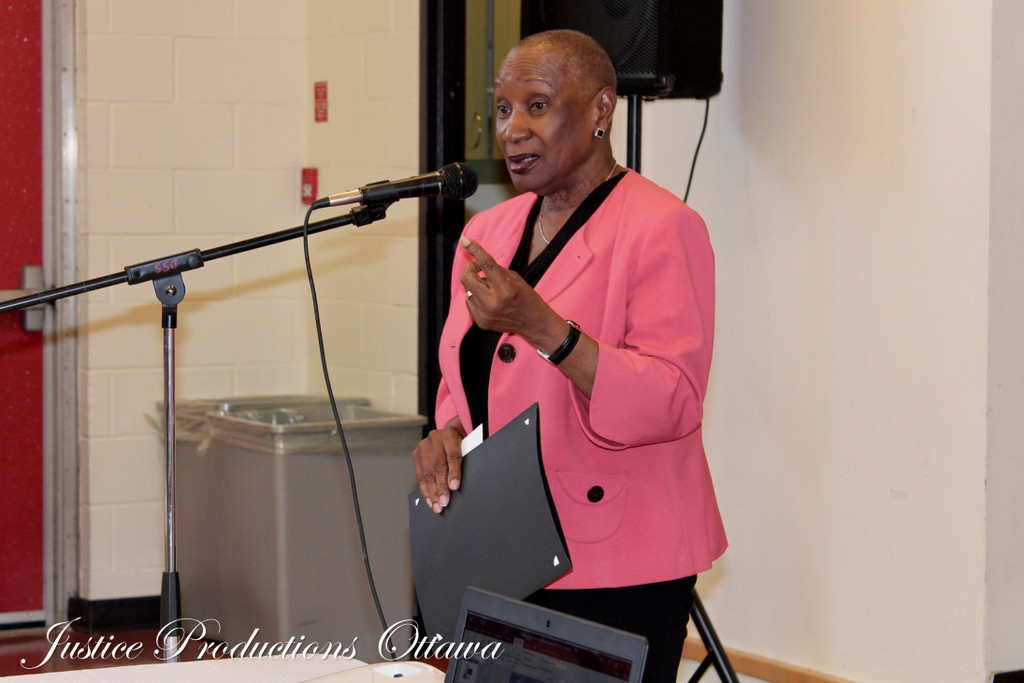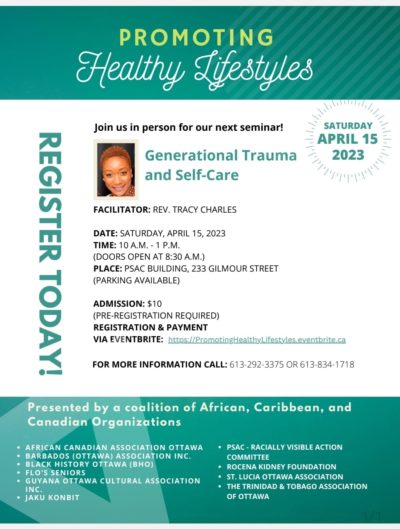
Generational Trauma and Self-Care: Key Takeaways from a Health Seminar in Ottawa
Saturday 15 April 2023
by Hussein El Hajj Hassan
A health seminar was held in Ottawa, Canada, under the title “Generational Trauma and Self-care,” organized by the African, Caribbean, and Canadian Health Coalition. The seminar addressed the intergenerational traumas or generational curses and self-care practices that could help individuals in their healing journey.
The seminar began with Chair of the Coalition, Ingrid John-Baptiste introducing and welcoming the guests, with a briefing on the day’s schedule, followed by the introduction of the keynote speaker.
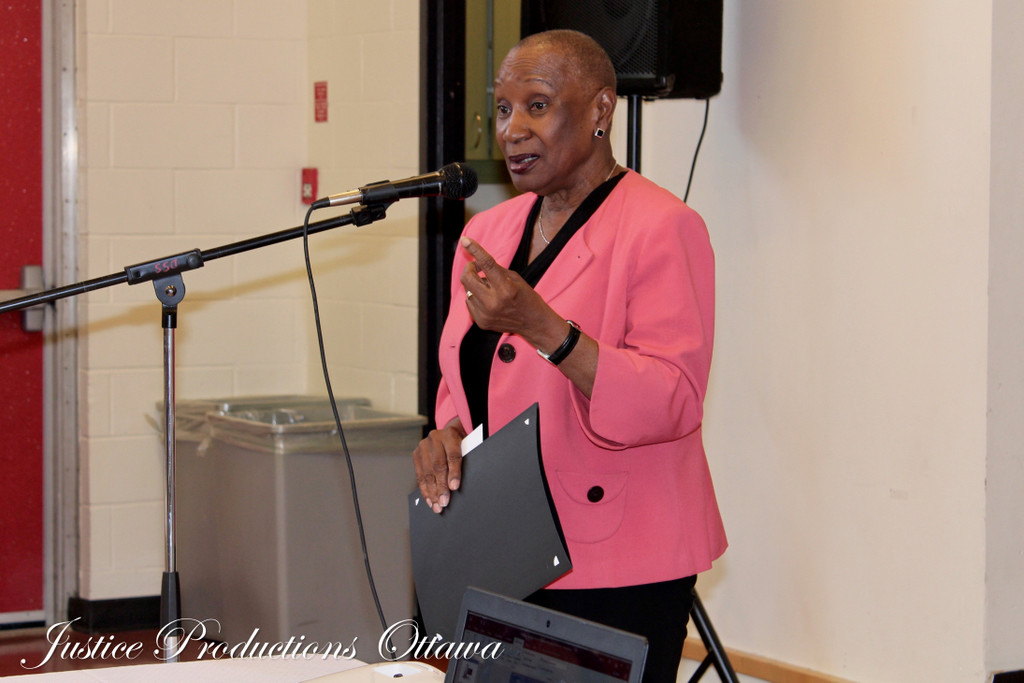
Keynote speaker, Tracy Charles, is a clinical social worker and a member of the Anti-Black Racism Task Force, among other roles. In her presentation, she highlighted that intergenerational traumas occur when one generation experiences an event or series of events that negatively impact their sense of safety and well-being, leading to a ripple effect on future generations. Trauma affects everyone, irrespective of race, religion, wealth, or social status. The speaker emphasized that trauma is always a trauma, regardless of its severity.
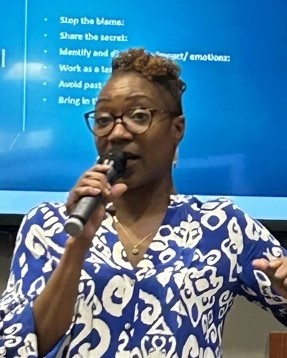
Keynote speaker Tracy Charles
The speaker pointed out that traumatic events may lead to inter-generational trauma, such as racism, domestic violence, child abuse, natural disasters, alcohol use, and historical events. The effects of trauma can be represented in both social and emotional intelligence, lack of trust, anger, irritability, nightmares, fears, inability to connect with others, low self-esteem, and anxiety.
She also spoke on immigration traumas, where immigrants try to fit into a new life that is so difficult to get into. She highlighted that a family is essentially our first university, and the actions and behavior of parents impact children, sometimes causing damage. Traumatized people will have problems fitting in; they will have problems in school, “no child is born as a bad kid,” and some traumatic events may lead to inter-generational trauma. For instance, a girl who found out her father was cheating on her mother and asked to keep it to herself, may be so traumatized that it affects her own life and relationships.
In the second part of the seminar, Tracy discussed trauma triggers and ways individuals can heal. She emphasized that shifting the narratives is essential in the healing journey. It takes work and effort, but healing is possible. Tracy quoted Dr. Lauren Mersy, saying, “If someone’s reaction seems out of proportion to the situation, it usually means that something else was triggered.” Trauma triggers can be images, words, certain places, times, anniversaries, smells, tastes, or any other factor that brings up memories.
To heal from generational traumas, individuals need to stop blaming, share their secrets in a safe place instead of burying them, identify and discuss the impact, work in teams, avoid past mistakes, and seek professional help. Individuals must also focus on the social determinants of wellness, including educational access, healthcare access, economic stability, social and community context, neighborhoods, and environment. To boost psychological health and well-being, individuals should get adequate sleep, eat healthily, be physically active, journal, build social support, join a community-based life skills program, and engage in helping others.
The speaker’s favorite book on this topic is “The Origins of You” by Vienna Pharaon.
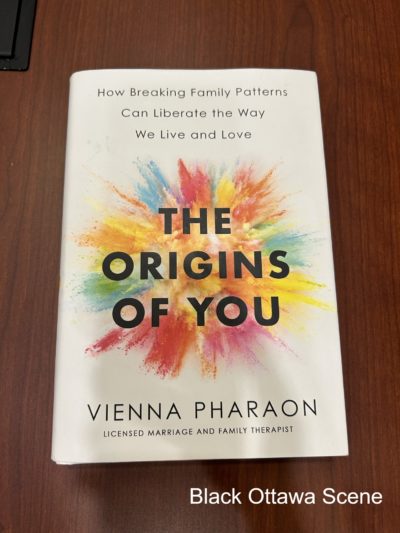
Additionally, attendees were encouraged to seek out resources within their communities and online to continue their healing and self-care journeys. Tracy recommended resources such as Black Indigenous and People of Colour (BIPOC) therapy in Ottawa and Toronto, Distress and crisis lines, ConnexOntario, Good2Talk, and CounsellingConnect.
Overall, the seminar was informative and eye-opening, highlighting the importance of acknowledging and addressing generational trauma and its effects on mental health and well-being. Tracy’s insights and recommendations provided attendees with valuable tools and resources to help them on their journey toward healing and self-care.
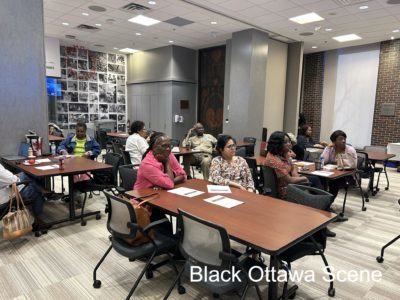
A section of the audience
In conclusion, the health seminar on Generational Trauma and Self-care in Ottawa, Canada, organized by a coalition of African, Caribbean, and Canadian organizations, was a powerful and educational experience. The seminar addressed the issue of intergenerational trauma, how it can impact individuals and families, and ways to heal and move forward. Tracy Charles, the main speaker, provided valuable insights and resources to help attendees on their journey toward healing and self-care. By recognizing the impact of generational trauma and taking steps toward healing, individuals can break the cycle and create a better future for themselves and future generations.
*****************************************************************************************
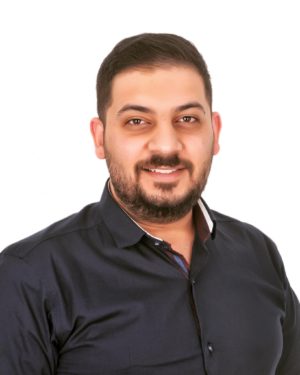
Hussein El Hajj Hassan is a Lebanese-born journalist and researcher who has recently relocated to Canada. Hussein’s journey began in 2011, where he began his career as a political activist advocating for peace, human rights, and sustainability. With his specialization in investigative and political journalism, Hussein is a skilled writer in both English and Arabic languages.

